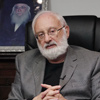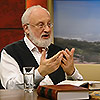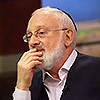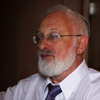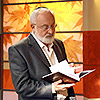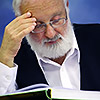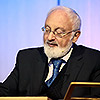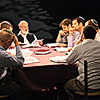Which to Choose: Plain Truth or a Beautiful Lie?
 Question: There were two books on the bookshelf, one was expensive with beautiful binding and the other in a cheap, poor binding. The owner read the expensive, pretty book and said: “This is neither for the mind nor for the heart.” He read the inexpensive one, cried, and said: “I have never read anything more useful for the soul.”
Question: There were two books on the bookshelf, one was expensive with beautiful binding and the other in a cheap, poor binding. The owner read the expensive, pretty book and said: “This is neither for the mind nor for the heart.” He read the inexpensive one, cried, and said: “I have never read anything more useful for the soul.”
He still left both books on the shelf, one for the soul and the other, beautiful one, for people.
Why, after the owner found the truth, does he think so poorly of others?
Answer: He does not think poorly. First, he has no right to take away their freedom of choice or impose anything.
Second, only in this way, when you have two sides of the same coin can you show a person which path leads him where. Therefore, we must leave both books.
Comment: He found the truth. He wants others to slowly get closer to it too.
My Response: Certainly.
Question: Still, can one live only through inner work, only through this unsightly book that contains the truth?
Answer: No, this work must be combined with practice. Practice is a struggle. It is a physical fight with those who oppose it. That is why we returned to this country, to this land, and why the Creator prepared what for us to do in advance, these trials.
Question: If we reach the truth, will these trials seem to dissipate? Isn’t that why they exist, to push us?
Answer: Certainly, trials exist so that we can build ourselves and this truth to enter us.
Question: Do we still meet a person based on our soul or appearance?
Answer: I do not know. It depends.
Question: I will ask it even more simply: Is love at first sight based on one’s soul or appearance?
Answer: At first sight, something that is brighter catches your eye.
Question: What about love at first sight when, for example, one can no longer live and walks around thinking only about it?
Answer: If this is already becoming awareness, the first glance will not help.
Question: So the look is still external?
Answer: Yes, it is simply blinding. And then, when you begin to look closer, it is no longer love and not the first glance. It is already a feeling of similarity, closeness, understanding, devotion, etc.
Question: Does the similarity of properties allow people who live 50 and 60 years together to continue like this?
Answer: Certainly, those people who have lived together for more than 10 years, even just 10 years, already live on what they have acquired—those common feelings, properties, understandings, and so on.
Question: Grigory Perelman, a famous mathematician, refused a million-dollar prize and did not want to move anywhere. He lives, or lived, with his mother, alone, and so on. He has nothing external; he is always dressed the same. He lives internally. What is it? Or is this a natural state for scientists?
Answer: This is the natural state of life for people like him who live to understand creation. Feeling the image of creation within himself is the most important thing for him. He is disconnected from everything.
He is not interested in politics, war, or anything else, only in his cerebral uneasiness, which does not give him peace.
Question: What kind of world do such scientists live in? It isn’t in this one, is it?
Answer: No, not in this one of course, not the world of today. Most of the scientists live in some kind of interstellar space.
Question: Is this world enough for him? What is enough for him? Sandals, trousers, shirt, and off you go?
Answer: Yes, that is how he appears.
Question: His world is different. Is it a rich world?
Answer: It is a world in which he feels rich and sufficient. There is nothing else.
Question: I will ask you as a scientist, how does he perceive all of us, everyone around him who make films about him, talk about him, and so on?
Answer: Indifferent.
Question: As if we do not exist?
Answer: Yes, for him, it does not exist.
Question: Great scientists, were they like that?
Answer: There are very few of them. Each of them has its little devil inside.
Question: Kabbalah is the science of inner experiences and desires. Even though we are disseminating Kabbalah, are we still making it external to people and gradually attracting them? Or what are we doing?
Answer: We want to attract people to the inner state of Kabbalah that speaks about the revelation of the Creator to man in our world.
Question: Do we make it attractive to them for this? Is this right?
Answer: How else will you do it?
Question: So, do we have to spruce it up for them?
Answer: Of course, all people are like children. When we approach something or someone, we approach from afar, gradually.
Question: Is it possible to take complex texts and popularize them gradually?
Answer: Of course, yes. Baal HaSulam did what the Ari and other great Kabbalists before him did. They devoted a lot of time and attention to this.
Question: To bring this science to people?
Answer: Yes, it is very challenging. Although their highest texts are high for us. And for them, it was descending to people like us.
Question: So this is the correct process: do not rise to me, I will go down to you and raise you?
Answer: What else can you do? Otherwise, we will never have contact with those souls who have reached the Creator and are at that level.
[326956]
From KabTV’s “News with Dr. Michael Laitman” 2/26/24
Related Material:
Let’s Talk About Beauty
The Beauty That Has Been Imposed On Us
Slender Figure: Beauty Or Harm To Health?

